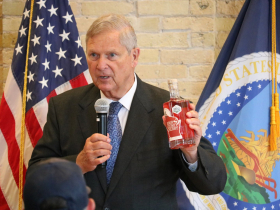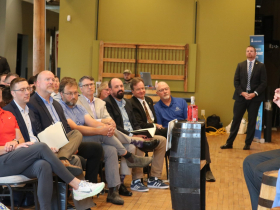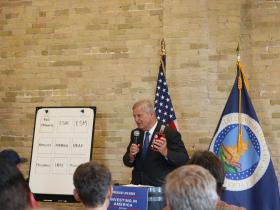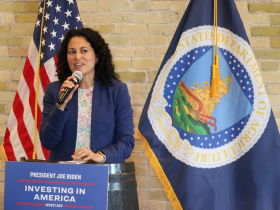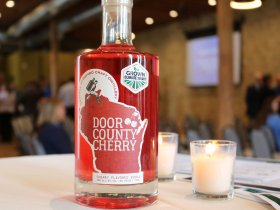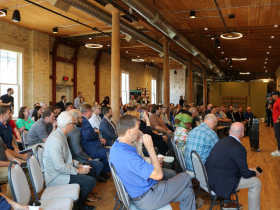U.S. Agriculture Secretary Touts Climate-Smart Farming in Milwaukee Visit
At Central Standard distillery, Vilsack details impact of federal funding for smaller farms.
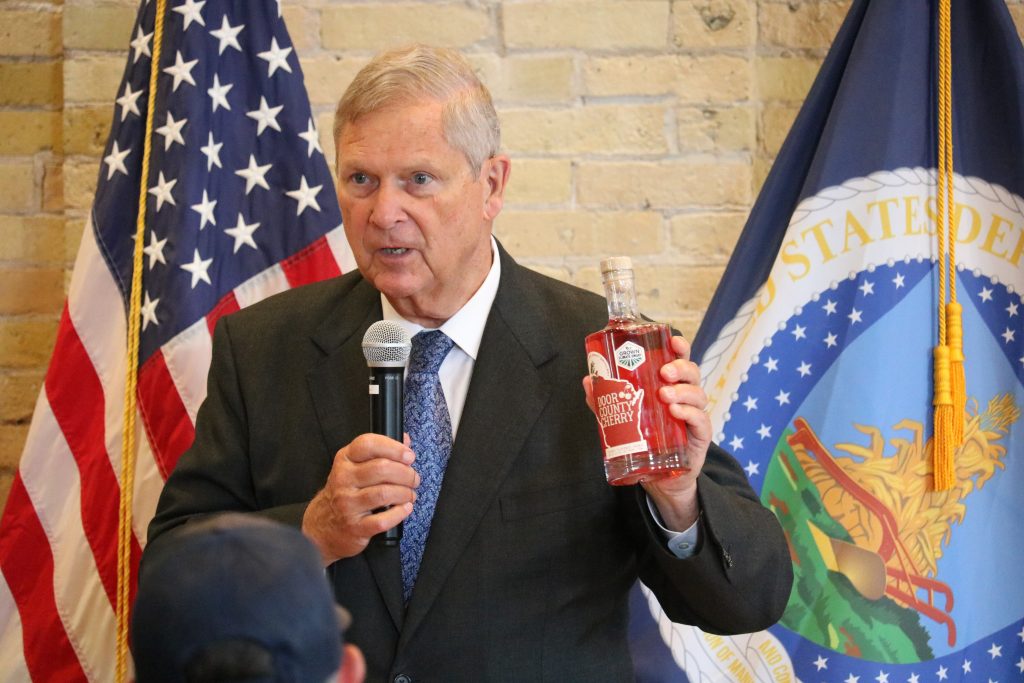
United States Secretary of Agriculture Tom Vilsack addresses the crowd at Central Standard Craft Distillery during an Aug. 19 visit. Photo by Sophie Bolich.
United States Secretary of Agriculture Tom Vilsack met with farmers, community leaders, union representatives and several other groups on Monday to discuss the role of climate-smart investments in uplifting rural America.
Addressing a crowd of approximately 65 gathered in the second-floor event space at Central Standard Craft Distillery, Vilsack described how large-scale farming practices have decimated the market for small and mid-sized operations, leading 544,970 — or one in six — farms to disappear between 1981 and the latest Census of Agriculture.
Vilsack said he’s working to change the reality outlined by a former Secretary of Agriculture, Earl Butz, whose mantra to farmers was “get big or get out.”
“The question is whether we’re okay with that,” Vilsack said. “If not, what’s the alternative?”
The answer — at least for now — lies in the Partnerships for Climate-Smart Commodities initiative. The program, which uses federal funds to compensate farmers who implement one of 197 different climate-smart practices, is mutually beneficial: farms receive an additional income stream, while the United States Department of Agriculture gathers valuable information about the viability of sustainable practices.
The program currently enrolls nearly 13,000 farms, with that number expected to reach close to 20,000 by the end of the year, Vilsack said. He hopes to eventually surpass 50,000.
One such farm is that of Graham Adsit, who works with The DeLong Co., Inc. to supply grain to Central Standard, which operates its distillery out of the building at 320 E. Clybourn St.
“In farming, I look for these opportunities to be better,” Adsit said. “For many years, I sought a program that had validation, that had integrity, and went all the way from the field to the storefront to the fork. With climate smart, I feel that I have this.”
Central Standard’s bourbon, whiskey, vodka, gin, pour-ready cocktails and other products are stamped with a climate-smart seal. The distillery, which recently celebrated its 10th anniversary, has also reaped the benefits of the initiative.
“Our grains have gotten a lot better through this program, thanks to Graham and DeLong group,” said Central Standard co-founder Pat McQuillan. “For the first six or seven years, we couldn’t find a repeatable source, a lot of times, that had good quality … for us to be able to do that and utilize it and see how we can help farmers and they can help us, it’s been awesome.”
The DeLong Co., Inc., which spearheaded the Grown Climate Smart initiative, acts as a bridge between Central Standard and Adsit, as well as other pairs encompassing roughly 365,000 acres across seven states.
“We all know growers are incredible stewards of the environment, but they’re very pragmatic business people, and they had to see the promises being made by the USDA and the DeLong company come to fruition,” said Chris DeLong, the company’s president. “I’m very happy we did.”
Vilsack took a moment to praise the distillery.
“I’m told that part of my job today is to make sure you’ve got the chance to have some seriously good hooch,” he said, holding up a bottle of Central Standard’s Door County cherry vodka.
“It’s got the climate smart seal on it, which is an indication of a desire to say to consumers, ‘this is something that was locally produced, locally supported, creating jobs here in Wisconsin, helping Wisconsin producers. And it’s great for the climate.'”
Under Vilsack’s purview, the United States Department of Agriculture (USDA) is investing more than $3.1 billion for 141 projects through the climate-smart initiative — all touted as environmentally-conscious.
But more than a dozen members of Congress have expressed concern over certain parts of the program, suggesting in a February 2024 letter that it could “further entrench the unsustainable, inhumane industrial model by funneling a significant portion of conservation dollars to a handful of large producers instead of supporting more small and mid-sized producers.”
Deputy Secretary of Agriculture Xochitl Torres Small, who appeared with Vilsack at Monday’s event, offered a different perspective.
“When you have thriving small and mid-sized farms, you have robust communities,” she said. “It takes a farmer who’s willing to say, ‘I see the practices that we do now, and I know the value of the work that I do now. I’m also going to keep innovating so that we don’t have to keep getting bigger and bigger.’ Instead, we can be innovative.”
Vilsack also noted the existence of a micro-farm program offered through the Climate Smart Agriculture Initiative, which is “essentially focused on ensuring that historically underserved producers would participate.”
“We’re providing resources for farmers to get started small,” he said, adding that the program offered loans and risk management tools designed specifically for “very small” producers and operators.
Vilsack’s stop in Milwaukee was part of an ongoing, nationwide tour to raise awareness of the USDA’s climate-smart initiatives. Or, as Torres Small calls it, his “whiteboard speech.”
“With these historic investments from the Biden-Harris administration, there’s a real aim and a goal associated with it,” and “it is directly at the hearts of small and mid sized farmers,” Torres Small said. “It is directly at the heart of rural America, and it’s about the diversity of that production.”
The two-hour session concluded with an extensive question-and-answer portion, with representatives from Organic Valley, Feeding America, Marbleseed and numerous other organizations participating.
Randy Romanski, secretary of the Wisconsin Department of Agriculture, Trade and Consumer Protection, shared his gratitude for the USDA’s continued collaboration.
“The recent resources we’ve seen come from USDA are transformational in how they’re allowing farmers, allowing businesses, to make those investments that are going to matter now, tomorrow, next year, and way down the line.”
Vilsack is the sixth member of Biden’s cabinet to visit Milwaukee in the past two weeks. Transportation Secretary Pete Buttigieg visited the Milwaukee port and road an Amtrak Hiawatha train, Attorney General Merrick Garland participated in a public safety event at the U.S. Federal Courthouse, Secretary of Energy Jennifer Granholm promoted a home energy efficiency program, acting Secretary of Housing and Urban Development Adrianne Todman toured a military-family housing development and met with local housing officials and Acting Secretary of Labor Julie Su held a press conference with Mayor Cavalier Johnson to discuss job growth in the city.
This article has been updated to correct a speaker’s surname
Photos
If you think stories like this are important, become a member of Urban Milwaukee and help support real, independent journalism. Plus you get some cool added benefits.


